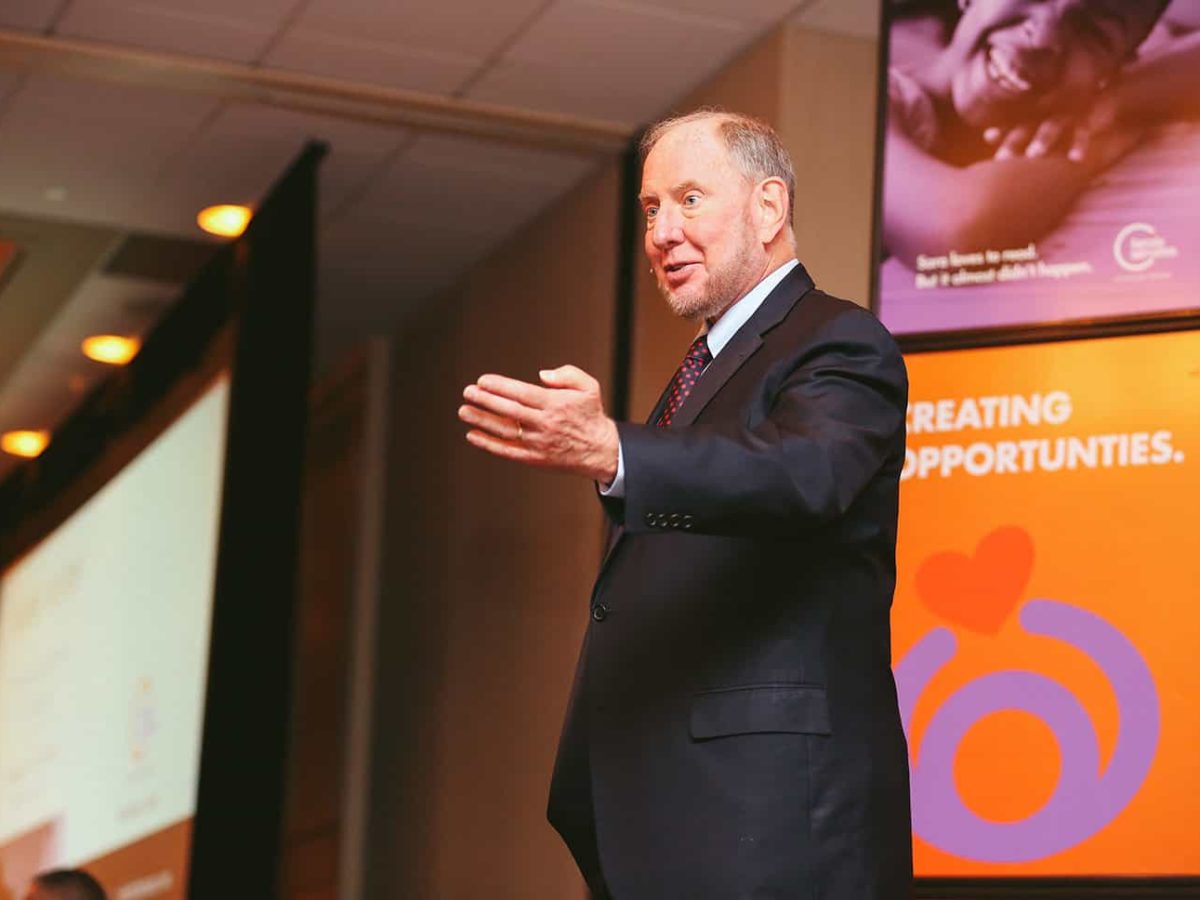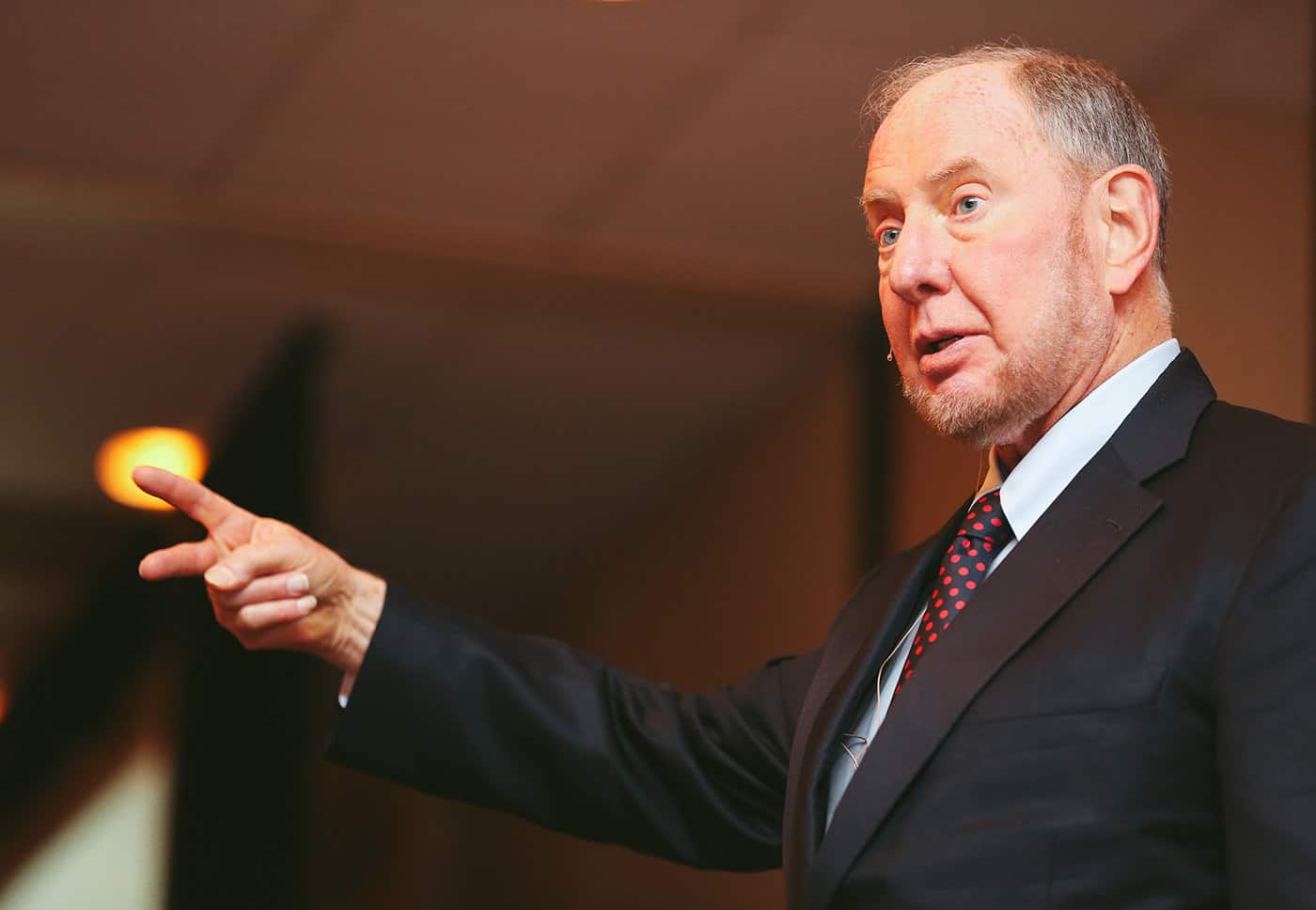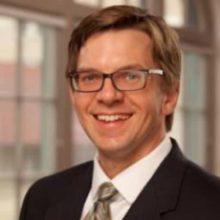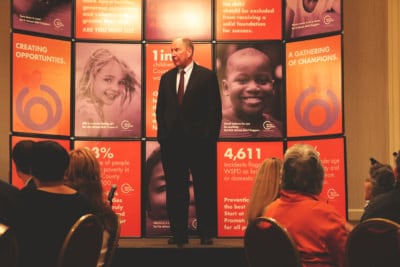
Editor’s note: In November, Harvard Professor and author Robert Putnam visited Winston-Salem to speak at the Raising Every Child luncheon for Family Services of Forsyth County. You can read more about Dr. Putnam’s presentation here. Education NC interviewed Dr. Putnam by phone after his visit to North Carolina.
Todd Brantley (TB): I was reading about the Social Capital Community Benchmark Survey in 2001. Your work found that Forsyth County had the sixth highest faith-based capital among the 60 communities you looked at. I was curious, what is the role of faith communities and houses of worship in promoting educational attainment and improving economic security? What are they doing well and what can they do better?
Robert Putnam (RP): First of all, it is certainly true that Forsyth County and much of the South is very strong on religious social capital, by which I mean not just that people in Forsyth County are faithful…I’m not talking about their theology, I’m talking about the fact that churches or other places of worship are sites not just where people congregate, but where people help one another and engage in the mutually supportive activities that make up social capital. I wrote a book after that Social Capital Community Benchmark Survey of nearly 20 years ago. A book called American Grace, not Amazing Grace. It was a big, long book about the role of religion in American life and in particular the role of religion in American community life. My co-author, David Campbell, and I found, to sum it up in a short sentence: Religious people are nicer.
Comparing apples and apples, that is controlling for all the other things that affect how generous we are, religious people are more likely to give to charity, including more likely to give to secular charities. More likely to volunteer, including for secular purposes as well as church purposes. Not just that they are more likely to be church ushers, they’re more likely to be volunteers in the soup kitchen or working in the PTA and so on. They’re more likely to help old people across the street and so on. It’s quite a general pattern.
I don’t mean that religious people are saints — there are lots of saints and sinners everywhere. I mean that something about religious communities — and I want to stress that it is something about the community, not the theology that distinguishes religious people. I am certain that a good share of the social capital in Forsyth County is embodied in all the churches and other religious institutions. I don’t mean in the physical buildings; I mean in the congregations. That is the first thing to say.
The second thing to say, if I were giving a rounded account of religious social capital, I would say that religious people are not necessarily the most tolerant people always. That is something you have to take into balance. I’m certainly not trying to tell people in Forsyth County whether they should go to church or not, that’s not my point. I feel very positive about the role the churches play. There is another dimension, which is what role do religious communities play in the public square. Not just what individual acts of charity do religious people perform, but to what extent do religious people rally to causes that are helpful to the larger community.
As we well know, religious communities across America have focused mostly over the last 20 or 30 years — in their public presence —on issues of abortion, homosexuality, and so on. That’s not my personal views on those issues, but it doesn’t matter — it’s perfectly legitimate for them to lobby and speak out on behalf of the point of view of religious people on issues like that. I am not speaking specifically about Forsyth County, because I did not visit individual congregations in Forsyth County. But nationwide, I think church people have not spoken up as much on issues of poverty, social inequality, and social mobility. They’ve not given the same attention to those issues in their public presence as they have to issues of homosexuality and abortion.
What I have said regarding the issues I am most concerned about, is that getting America’s faith communities more involved in public action on issues of inequality and poverty and so on, is almost a necessary condition for solving the problem and almost a sufficient condition for solving the problem, by which I mean, it’s hard for me to see how we can rally the support to do the things we need to do — including early education — unless church people speak up.
Getting America’s faith communities more involved in public action on issues of inequality and poverty and so on, is almost a necessary condition for solving the problem and almost a sufficient condition for solving the problem, by which I mean, it’s hard for me to see how we can rally the support to do the things we need to do — including early education — unless church people speak up.
On the other hand if church people did speak up on that issue [early childhood education], it’s going to be hard to stop that movement that’s pretty strong in Forsyth County. I want to be careful and hope you’ll phrase this in a way that doesn’t make it sound like I’m lecturing at and telling church people in Forsyth County what they should do. What I’m saying is, church people are great with respect to private charity and private volunteering, and that’s wonderful. They’re doing better than secular people. But that is not enough to solve the problem of the size that we all face in America and in Forsyth County with respect to poor kids who have been left behind.
TB: In Our Kids, you speak about how we’ve become a country divided by educational attainment. In my opinion, we are also a country increasingly divided by rural and urban. We’ve seen some of that in this past election. Is educational attainment, income inequality, lack of economic mobility… are these two different problems that require two different solutions based on what community you live in?
RP: Well, basically I think the answer is no. But when you say “these two different problems,” tell me what two different problems you mean.
TB: If we’re going to address issues of educational attainment and economic mobility, do they look different in the rural community as opposed to the urban community?
RP: Yes, they do. Both in North Carolina and around the country, they look different. The face of urban poverty is largely, though not exclusively, non-white. The face of rural poverty is largely white. Of course, that is an exaggeration. There are poor black communities out in the sticks and poor white people in cities. But basically, that is the contrast.
In terms of the policy you want to follow, I’m not sure that it’s all that different. I’m sure race looms large in people’s minds all over America, but actually the problems that face poor blacks and the problems that face poor whites are not all that different. In both cases, for example, the family structure has been shattered by economic hard times. As a country we’ve been discussing the troubles facing the black family for a long time, but when the hard times hit the white community exactly the same thing happened, the family structure largely fractured in the poor, and that means mostly rural, white communities.
All the things I talk about in Our Kids, really are…I don’t want to say color blind, but they’re the same problem. They are the problem of needy families and fragile families and low-income schools and dangerous neighborhoods and substance abuse. The substances abused may be different between cities and the countryside, but at least up here, I don’t know about down there, but up here the opioid epidemic is rampant, it’s terrible in New Hampshire, and it is terrible in rural New Hampshire. I don’t know if that’s true in rural North Carolina or not.
TB: It’s largely methamphetamines here.
RP: Well, it’s the same basic pattern. The first order of proclamation, as problems to be solved, those are one in the same problems, even though it looks different on the face of it. Part of the problem politically is the advocates of poor blacks and the advocates of poor whites too often have seen each other as rivals, whereas on the contrary they should be the closest of allies.
Part of the problem politically is the advocates of poor blacks and the advocates of poor whites too often have seen each other as rivals, whereas on the contrary they should be the closest of allies.
TB: In Our Kids, one of the things I really enjoyed reading about was Port Clinton and that in the time you grew up there the point of contact for the entire community was the public school system. You talk about how today you have these private publics, because of how we tend to congregate in our neighborhoods and how some schools have more of a tax base than others and there are wealthier public schools. If our new reality in this country is the growth of charter schools, private schools…and in North Carolina, if you took all the homeschooled students and combined them into a standalone school district, you’d have the third-largest school district in the state. If this is our new reality in education, how do we address the issues of social capital and economic mobility and educational attainment?
RP: That’s a really good question. Homeschooling is not as big up here as it is down there, but I know exactly what you are talking about. Some of my nieces and nephews in Florida are homeschooling all their kids. So I know that reality too. I think it’s not a healthy development. First of all, let’s talk about the quality of the education. Some kids who are homeschooled and some kids going to charter schools are getting a terrific education. You can name kids in charter and homeschools who are just fabulous. And, you can name kids who are going to an ordinary public school who are fabulous. There are great charter schools and there are great public schools. And there are awful public schools and there are awful charter schools. As I read the evidence, it is what the schools do with their kids, not the modality of governance, that makes a difference in the quality of education. That’s the first thing I would say. Especially if the charter schools are allowed to skim, that is they pick the kids they take. That is really bad, honestly, because it undermines the whole idea of a common school: We’re all in the same country and we’re all connecting with each other and we’re all getting the same starter boost.
I do not know about all charter schools in North Carolina. In Boston, we just had a big debate about charter schools and narrowly the expansion of charter schools lost. But, charter schools in Massachusetts cannot skim. They’ve got to take kids. They have to take kids who are challenges, not just kids whose parents are already doing a good job educating them.
They are two separate questions in a way. One is the quality of education these kids get. I see that as a problem whether we’re talking about homeschool, charter school, or public school. The second is, going to school together, and to the extent that homeschools, charter schools, undermine social, economic, and racial integration, that’s bad for the community. All our kids have to know all our kids. If we raise one set of kids in one set of institutions and the other in another set of institutions, that for sure is going to perpetuate this increasing division of our communities along class lines.
All our kids have to know all our kids. If we raise one set of kids in one set of institutions and the other in another set of institutions, that for sure is going to perpetuate this increasing division of our communities along class lines.
TB: One way I like to frame this when I speak with people in North Carolina, is that North Carolina law mandates 1,025 hours of instructional time. In a year, that leaves 7,735 hours outside of the classroom. In speaking about education, how important are those hours outside of class to academic success and economic mobility?
RP: Oh, hugely important.
TB: How can we as a society do better to help kids in school by addressing issues they face outside of school?
RP: Don’t get me started. What happens in the classroom is very important. I’m a teacher, of course I believe that. But evidence shows what’s happening in all those other hours in these kids’ lives has at least as much importance on their life prospects as what’s happening in the classroom.
By that, I mean, for example extracurricular activities. When I spoke [in Winston-Salem], I talked at great length about all the evidence that shows that extracurricular activities are very important not as a frill, but as a place where kids learn basic…what are called soft skills. That is grit. What my mom used to call stick-to-it-ivness. And teamwork. Lots of those skills are real skills, it’s not a frill. So much so that employers are willing to pay for those skills, by on average paying those kids who’ve taken part in extracurricular activities more than comparable kids who have not taken part in extracurricular activities. Those extracurricular activities could be band, chorus, football, French club…there is a whole range of things.
When I played football in high school back in Port Clinton in the 1950s, I was terrible at football. I was one of the worst kids in the whole school in football. But, nevertheless, I went out and practiced every day and I learned that if you wanted to do something right, you had to go at it again and again. I can’t tell you how many hours I spent in the summer blocking “blocking dummies.”
Secondly, you learn teamwork. I’m not just talking about football. The same is true for band. I had to spend hours learning to play trombone. I was terrible. Then you have to harmonize with everyone else. It doesn’t matter if you’re a great trombone player if everyone else if off tune. Those skills, increasingly our affluent kids in America are increasingly getting those skills, not as part of their regular public education, but because their parents are paying a ton of money for them to play in a private soccer league or for them to have private piano lessons.
The divisions in the experiences of rich kids and poor kids in America is at least as great as in those other hours. So those other hours can be helpful in many ways, partly because of the extra tutoring for kids. Those extra hours can be very important for extracurricular activities as I’ve said. Then, of course, those extra hours can be used in very bad ways if kids are living in a very dangerous neighborhood. Those are very dangerous hours. That is why parents in many of those poor neighborhoods where they don’t have good extracurricular activities end up sitting the kids in front of the TV. The TV at least is in the house, and they are less likely to get shot.
There could be very negative uses of those extra hours as well as positive uses. What we are doing in this country now is we are trying to encourage the one set of kids to use those hours in a way that will help them advance — those are the rich kids. And we are putting those other kids in a situation in which those extra hours are actually harming their progress, because they are huddled inside or they’re getting shot. I want to emphasize that I am not just talking about race when I talk about this. I am talking about social class. Those extra hours are very important, yes.
TB: A colleague had a question she wanted me to ask you. We talk a lot about how this [economic mobility] is a problem across the United States. And she mentioned that in the 90s people looked to Massachusetts as a state that was doing things right. It was held up as a state that was expanding healthcare, that was being very progressive and forward thinking in a lot of ways. Her question to you is, is there a state that is doing it right? Is there a state that we should look at who is trying to tackle this issue at the state level?
RP: Hmm. [Pauses] As it happens, Massachusetts is doing a pretty good job in this domain, too. The income gap between rich and poor is actually very high in Massachusetts. We have a lot of rich folk here because of the biotech revolution. There are a lot of rich folk in Massachusetts and also a lot of poor folk, though you’re probably less aware of that outside of here. We have a big gap in conditions, but relatively speaking Massachusetts is doing a better job than many other places in trying to shield kids from that income gap. Do you see what I’m trying to say? Ok, we’ve got great divisions in income at the parental level. But, what can we do to assure that kids, at least, get the same start regardless of the side of the line they live on or they are born to? We have a pretty good early childhood education program in Massachusetts. It’s not great, it’s not comprehensive, but we are expanding rapidly.
We have pretty good public schools. They are narrowing the achievement gap. We’ve got a lot of private organizations…people outside of Massachusetts think about us being this big government place, but we’ve got a lively civil society up here, too. There are a lot of groups that work with kids outside school hours. That helps. I picked on Massachusetts, because your colleague mentioned Massachusetts.
In terms of communities around America, there are lots of places. We’re in the middle of putting together a four-hour PBS documentary called My Kids that’s based on the book, but instead of focusing just on the problem, we are focusing on places around America where the problem is being solved, where people are actually making a difference. We’ve looked at Charlotte, we’ve looked at Duluth, we’ve looked at New Hampshire, and we’ve looked at Riverside, California, and places all over the country.
There are individual communities where there are people working hard to make a difference. Honestly, I came away from my visit to Winston-Salem thinking — not that there are no problems — but particularly in the area of early childhood education, the coalition that you guys have built or are building, because there are multiple organizations involved, but you’re on the verge, if that coalition in favor of early childhood education continues to go forward, you’re on the verge of being one of the leaders in the country on that particular part of the problem. I don’t say that to just be polite. I can tell you other places that are doing a good job too, but I’m trying to put it in the…now, you’ve got to follow through. It’s not just enough to have people sitting in a room saying, “Yes, yes, yes, we ought to have early childhood education.” You’ve got to follow through with the investments.
I came away, honestly, on that score, early childhood education, I came away thinking, “Huh, Winston-Salem. Got to remember to keep them on the map.”
TB: In those four communities you are looking at in that documentary, is there a theme?
RP: If I led you to believe there is just four, I was misleading — there is probably 20.
TB: That’s even better. In those 20 communities, have you noticed a theme in what these communities are doing? Is there something across communities that you are seeing that’s being done, or are they implementing solutions that are unique to their own place?
RP: The solution is different from place to place, of course, because of the details of the problem. Trying to close the opportunity gap in Seattle or Boston or Atlanta or Charlotte, is a different task from trying to solve that same problem in Duluth or Dubuque, or other places around the country, or for that matter in Riverside, California, which is part of greater Los Angeles, or really it’s part of Orange County.
Yes, the problems look different and people are trying different things. I think the common denominator is where this is working is where there is a group of people from multiple sectors — not just the education sector, but the business sector and the government and the school system and the churches, and so on. Where there is a coalition of leaders from various different sectors who say this is a big deal. This is not priority number 66. For the future of our town, this is a big deal, and we’re going to have to make some investments ourselves and our community is going to have to make some investments.
You can’t do this for free. You don’t get good things like this for free. We’ve got to figure out where we are going to get the money. And there is enough of a structure that somebody has got to wake up every morning and this is his or her most important problem. What they’re going to worry about all day long is how we are going to get more kids in Forsyth County into higher quality early childhood education. That requires some organization. That passion of local leaders is the distinguishing characteristic, not some magic bullet in terms of policy proposals.
That passion of local leaders is the distinguishing characteristic, not some magic bullet in terms of policy proposals.



